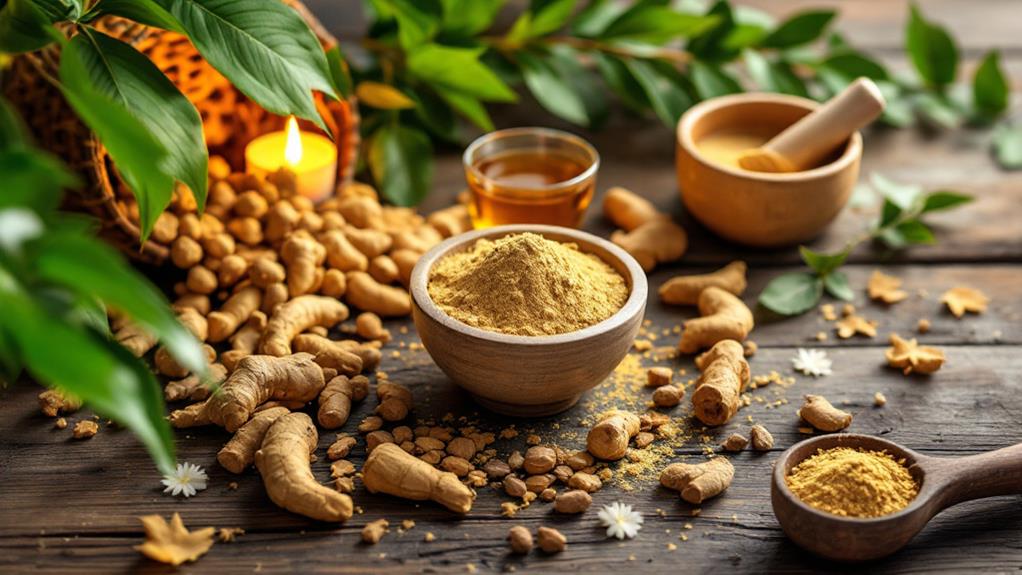The Benefits and Uses of Ashwagandha: A Natural Stress Reliever

Ashwagandha, an ancient herb, is celebrated for its adaptogenic properties that help you manage stress by lowering cortisol levels. Traditionally, it's used in Ayurvedic medicine to relieve anxiety and fatigue, elevate athletic performance, improve sleep quality, and support sexual health. Clinical trials confirm its effectiveness, showing reduced stress and enhanced psychological well-being with daily dosages of 500-600 mg. While generally safe, mild side effects like gastrointestinal discomfort can occur, and it's wise to consult a healthcare professional before use, especially if you're pregnant or on medication. Investigate how this natural remedy could further benefit your well-being.
Overview of Ashwagandha
Ashwagandha, known scientifically as Withania somnifera, is an evergreen shrub that's made a significant mark in the world of natural remedies. Native to India and the Middle East, it has been a staple in traditional medicine, particularly for its adaptogenic properties, which help the body manage stress. If you're feeling overwhelmed, ashwagandha might be just what you need to help reduce stress and anxiety. Its roots contain withanolides, compounds that contribute to its stress-relieving benefits by lowering cortisol levels, the hormone linked with stress.
Research suggests that taking a daily dosage of 500-600 mg of standardized ashwagandha extract can improve psychological well-being by reducing anxiety and boosting sleep quality. These benefits make it a powerful tool for anyone looking to improve their mental health and resilience against stress. It's generally safe to use, though some might experience mild gastrointestinal discomfort. However, keep in mind that long-term safety data beyond three months is limited, so it's wise to consult with a healthcare professional about its use. Ashwagandha's potent benefits can offer a natural way to promote balance and tranquility in your life.
Traditional Uses
In the domain of traditional medicine, ashwagandha has long been revered for its diverse therapeutic benefits. Known scientifically as Withania somnifera, this powerful herb has been a staple in Ayurvedic medicine for centuries, offering natural remedies for stress, anxiety, and fatigue. As a "Rasayana," ashwagandha is believed to improve mental and physical energy, supporting overall well-being and longevity.
Its adaptogenic properties make it particularly effective in improving sleep quality and alleviating insomnia. By helping your body manage stress, ashwagandha promotes relaxation and a more restful sleep. Beyond its calming effects, the herb has traditionally been employed to enhance athletic performance. Historically, it was recommended for improving stamina and aiding recovery in physical activities, making it a favorite among athletes seeking natural improvements.
Furthermore, ashwagandha has been used to support sexual health and fertility, particularly in men. The herb's potential to improve testosterone levels and reproductive function has made it a sought-after natural option for boosting sexual energy. By incorporating ashwagandha into your routine, you tap into a rich tradition of holistic healing, aiming for a balanced, healthier life.
Stress and Anxiety Relief

Managing stress and anxiety is vital for maintaining mental health, and ashwagandha offers a natural solution to help you achieve this balance. With its adaptogenic properties, ashwagandha helps modulate your body's stress response, making it easier to handle everyday pressures. Clinical trials have demonstrated that taking ashwagandha can considerably reduce stress and anxiety levels. Doses ranging from 500-600 mg per day have shown marked benefits, including improved psychological well-being and lower cortisol levels, the hormone often linked to stress.
If you struggle with generalized anxiety disorder (GAD), ashwagandha might be a worthwhile supplement to your routine. Research indicates that 1,000 mg daily for 12 weeks can reduce anxiety symptoms, helping you feel more at ease. By supporting mental resilience, ashwagandha strengthens your ability to cope with challenging situations without becoming overwhelmed.
Furthermore, ashwagandha's impact on cortisol levels and its capacity to improve sleep quality indirectly aid in anxiety management. In studies, a considerable percentage of participants reported better sleep, which is vital for reducing anxiety. In summary, incorporating ashwagandha into your lifestyle could be a valuable step towards achieving stress relief and enhancing your psychological well-being.
Sleep Quality Improvement
A significant number of people are finding that ashwagandha can improve their sleep quality. Research shows that ashwagandha's adaptogenic properties may help regulate cortisol levels, a stress hormone that negatively affects sleep. By balancing these levels, ashwagandha can contribute to better sleep patterns. One study highlighted that 72% of participants who took ashwagandha experienced improved sleep quality compared to only 29% in the placebo group.
In clinical trials, participants who used ashwagandha reported falling asleep faster, reflecting reduced sleep onset latency. This can be particularly beneficial for those struggling with insomnia, as quicker sleep onset often leads to longer, more restful sleep. A systematic review of five studies found a significant, albeit small, positive effect of ashwagandha on sleep, especially when taken in doses of 600 mg per day over eight weeks.
Additionally, those with insomnia noted improvements in mental alertness during the daytime. This suggests that ashwagandha not only helps improve sleep but also boosts daytime functioning due to better rest. By incorporating ashwagandha into your routine, you might find a natural way to improve your sleep quality and general well-being.
Safety and Side Effects

While ashwagandha offers promising benefits for sleep quality, it is crucial to evaluate its safety and potential side effects. Most people tolerate ashwagandha well in clinical studies up to three months. Common side effects include mild stomach upset, loose stools, nausea, and drowsiness. However, you should be aware of rare but serious side effects, such as liver dysfunction and acute liver injury. These issues underscore the need for caution, especially if you have preexisting health conditions.
Pregnant and breastfeeding individuals should avoid ashwagandha due to potential risks to the fetus or infant. The safety of long-term use beyond three months remains unclear, so further research is necessary to determine its effects over an extended period.
If you're taking other medications, such as thyroid hormone treatments, antidiabetes drugs, or sedatives, use caution. Ashwagandha may interact with these medications, potentially affecting their efficacy or causing side effects. Always consult with your healthcare provider before adding ashwagandha to your regimen, especially if you have existing health concerns or are on medication. By staying informed, you can better assess the safety and potential risks associated with ashwagandha use.
Active Compounds
In ashwagandha, the active compounds known as withanolides play an important role in its health benefits. These compounds are celebrated for their anti-inflammatory and adaptogenic properties, helping your body manage stress more effectively. By modulating cortisol levels, withanolides can aid in stress management, reducing your body's stress response. This modulation is significant as cortisol is often called the "stress hormone," and keeping its levels in check is crucial for general well-being.
Moreover, withanolides demonstrate strong antioxidant activity, which helps protect your cells from oxidative stress and inflammation. This protection is vital, as oxidative stress can lead to numerous health issues if left unchecked. The root of ashwagandha also contains alkaloids, which may offer anxiolytic effects, supporting mental health by alleviating anxiety and depressive symptoms.
Withanolides have also been identified as natural cholinesterase inhibitors. By influencing neurotransmitter levels, they potentially improve cognitive function and memory. This aspect of withanolides can be particularly beneficial if you're seeking to support your mental health and cognitive abilities. Essentially, these active compounds in ashwagandha work synergistically to offer a thorough approach to stress management and mental well-being.
Health Benefits

Withanolides in ashwagandha don't just play a role in stress management but are also key to unfastening a range of health benefits. By taking ashwagandha, you can considerably reduce stress and anxiety, thanks to its ability to lower cortisol levels. Studies show that doses between 500-600 mg/day can lead to noticeable improvements in psychological well-being.
Beyond stress reduction, ashwagandha's adaptogenic properties help regulate your body's response to stress, influencing mediators like cortisol and the HPA axis. This modulation not only eases stress but also improves sleep quality. In fact, clinical trials indicate that 72% of participants experienced enhanced sleep compared to just 29% in the placebo group.
Additionally, ashwagandha can elevate your cognitive function, especially if you're an older adult. After eight weeks of taking 600 mg daily, you might notice improvements in executive functions, attention, and memory. Furthermore, ashwagandha supports hormonal balance, particularly noted in men with increased testosterone levels and better sperm quality.
Research Insights
Recent research into ashwagandha provides compelling insights into its wide-ranging benefits. Clinical trials have demonstrated that ashwagandha extracts can considerably reduce stress and anxiety levels. A systematic review identified seven studies involving 491 adults, showing how effective ashwagandha can be, especially when taken at doses of 500-600 mg/day. If you're struggling with anxiety, these findings suggest that ashwagandha might be a helpful ally.
Moreover, ashwagandha shows promise in improving sleep quality. In one study, 72% of participants taking ashwagandha reported better sleep, compared to just 29% in the placebo group. This suggests that ashwagandha's benefits extend to those dealing with sleep disorders.
The herb also targets cortisol, a hormone linked to stress. Research indicates that ashwagandha can lower cortisol levels, with one study noting considerable reductions after eight weeks of supplementation. This makes it a potentially powerful tool for managing chronic stress.
Additionally, ashwagandha's active compounds, withanolides, are thought to play a key role in its stress-relieving effects by modulating your body's stress response. Regardless of whether you're dealing with stress or seeking improved physical performance, ashwagandha could be beneficial.
Usage Guidelines

Understanding how to use ashwagandha effectively can enhance its benefits, especially if you're interested in managing stress or improving sleep quality. The recommended dosages of ashwagandha typically range from 250 to 1,250 mg per day, depending on your specific needs and how your body responds. For stress reduction, studies suggest a dosage of 500-600 mg daily, with noticeable improvements in stress and anxiety symptoms seen over eight weeks of consistent use.
Before starting ashwagandha, it's vital to consult with a healthcare professional, especially if you're on medication, pregnant, breastfeeding, or have underlying health conditions. This guarantees safety and helps tailor the dosage to fit your situation. Ashwagandha is available in diverse forms, such as capsules, powders, and liquid extracts. Most clinical trials use concentrated liquid preparations for ideal effects.
Quality control is fundamental when selecting a product. Confirm your ashwagandha is standardized, assuring consistent levels of active compounds like withanolides. Always choose products from reputable suppliers to enhance the herb's benefits and minimize potential risks. By following these guidelines, you can safely incorporate ashwagandha into your wellness routine.




